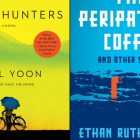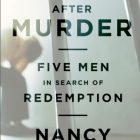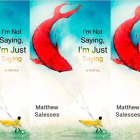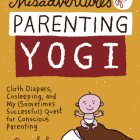For Those About To Write (We Salute You) #3: Letters
For Those About To Write (We Salute You) will present a writing exercise to the Ploughshares community every few weeks. We heartily encourage everyone reading to take part!
Well, my plan was to do a prompt a day since the last post, ten minutes a pop. That did not happen; life was a little busier than I anticipated. But I did manage a solid fourteen: some freehand, some at the computer—all of them beginning with an ugh and ending with an “ooh!”
Boy oh boy did I produce a lot of inelegant, all-but-incomprehensible junk. Just pages upon pages of poor, directionless prose. And guess what? It felt pretty awesome. That’s the most non-work-related writing I’ve committed to in years—seriously, years!—and the inner boost didn’t come from the quality of my output. It came from remembering that hey, I actually love making stuff up! The thrill of creation had been hiding under lots of protestations and insecurities and pesky thoughts of “eh, but it’s not going to be as good as that one thing I wrote that one time so why even bother.”
Not knowing where to begin felt like an insurmountable hurdle, but after a few minutes of scrawling I realized that there just might be some weird and wonderful thoughts kicking around in that noggin of mine—I just have to be bold enough to sit down and give them a chance, and patient enough to let them emerge.
Did anyone have any interesting breakthroughs? Stumble upon an idea, a character, or a turn of phrase that seems worth developing into something larger? After going back through my stuff, there’s a few nuggets I found that I plan on saving and potentially mining for more. Progress!
And now, onto our third exercise, in which we tackle the lost art of letter writing.
#3: Letter Writing
I’ve never been particularly drawn to collections of correspondence—there’s something about the idea of published personal missives that plays right into my deep-seeded fear that if it’s written down, someone you never intended is eventually going to read it. That being said, I’ve always been a big fan of sending letters. Plus, c’mon—receiving something in the mail is so, so great.
Letters can be an incredibly profound means to communicate, or a casual way to keep in touch, and just seeing someone’s handwriting is oftentimes enough to tug at my heartstrings and engender a particular kind of closeness: he held that note between his fingers, and now I hold it between mine.
So watch out, world; we’re bringing back the missive.
Supplies:
Select your favorite snail mail medium: postcard, greeting card, sheet of loose leaf. It has to be something that can be stamped and sent through the post.
Goal:
Write two letters: one that you’ll send, one that you won’t.
Consider the first an opportunity to reconnect. Get in touch with an old pal or share a funny childhood memory with mom; thank a mentor for her guidance, or sit at a cafe and describe the scene in detail, preserving that moment to share with a friend who can then imagine a teensy slice out of your day; let someone know that you adore them and wish they were near; compose a haiku.
In the second, allow yourself to express a sentiment that won’t, ultimately, leave your possession. Pen gushing fan fic to a star or an aching admission to an unrequited love; jot a furious diatribe to a former flame, or a snarky note to your neighbor about their poor taste in tunes, or an erotic fantasy to an totally and completely inappropriate partner.
The most powerful experience I’ve had with an unsent letter was almost a decade ago. In 2004, my grandma was given a very sudden diagnosis of brain tumors which had, on a dime, rendered this sharp-as-a-tack, hilarious, über-able-bodied lady unable to figure out how to tie her shoes or dial a phone. In a cruel twist, this occurred a mere month after she received the all-clear following a bout with esophageal cancer, which itself coincided with the celebration of 60 years of marriage.
I spent that summer with my grandparents, taking my grandma to radiation sessions, running errands, and spending lazy afternoons with her and my grandpa in their lovely little place in Ventura, California. In the car on the way home from her last treatment she put her hand over mine; her skin was burned and sallow, her hair had come out by the handful and was nearly almost gone; her once-round figure was now thin and frail. She looked at me and smiled and told me what a nice summer it had been, and how glad she was to spend that time together. Basically, she was the best.
A few months later I was back in London. The last time we talked on the phone she was using an oxygen machine and I could hear her get winded on the other end of the line; I told her that I loved her so much and it took her a few breaths to reply that she loved me, too. She passed away when I was two weeks into my MA degree in creative writing. I spent the entirety of the course attempting to work through my grief; each story I wrote danced around the themes of loss and death. Then one night after wrestling for far too long with the goddamn blinking cursor, I addressed her directly. “Dear Moomaw,” it began. I told her what it was like to see her suffer, and how sad and confused I was that she was gone. I let her know how much I missed her. And I felt better.
Time Commitment:
Completely open-ended. Take as much time on these as you want. Feel free to compose drafts on the computer then transfer to a paper product when you’ve expressed all you want/need to get out there.
Recommended Reading:
There are a million books of correspondence out there, but if you’re looking for some incredible online inspiration head over to Letters of Note. The brilliant site features a truly amazing array of collected correspondences, everything from a beautiful passage from John Steinbeck to his son Thom regarding a special young girl (“If it is right, it happens—The main thing is not to hurry. Nothing good gets away.”), to Gene Wilder’s specific stipulation to director Mel Stuart before confirming his acceptance of the role as Willy Wonka.



